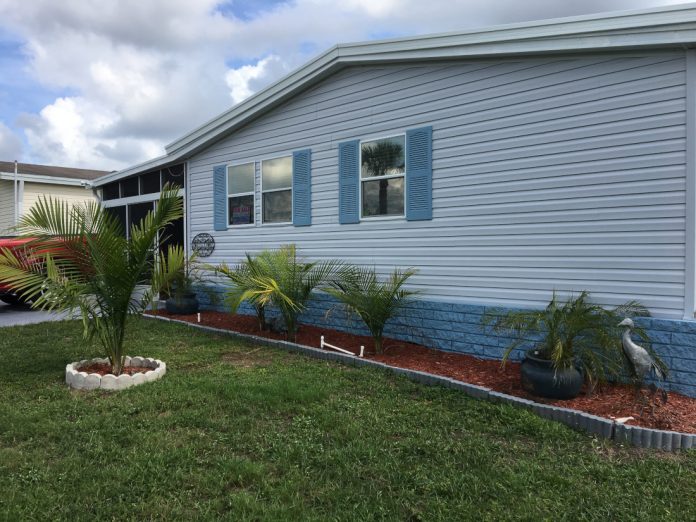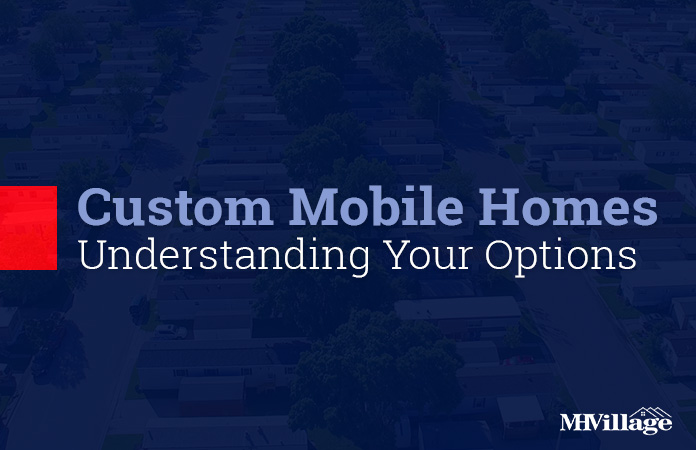A used mobile home can be an excellent option for almost any prospective buyer. However, it’s important to know what to ask during the buying process and how to evaluate the home’s condition.
Identifying a few key components can ensure that you are purchasing the home at the right price. Take into consideration age, amenities, necessary updates, and location.
There are a great many options for house hunters to consider when purchasing a used mobile home. The options include the type of home, as well as where it sits. Depending on how the home is associated with the land has an impact on finance options.
Examples of Ways to Buy a Used Manufactured Home
- Purchase a home with the land it sits on
- Buy the home on existing property that’s already owned
- Purchase a mobile home on leased land (often this is done by buying a used mobile home in a park or manufactured home community)
Key Tips for Buying Used

The Condition of the Home is Paramount
Like site-built homes, the value of a manufactured home is based to a great degree on how the home is built and maintained. The condition of a used mobile home is important not just to ensure you get the home you pay for, but also to understand how that home will hold up in the years to come.
The longevity of your manufactured home depends on the proper working order of primary systems, like the mobile home roof, flooring, heating and cooling. For that reason, it’s important to have a thorough mobile home buying checklist with you as you walk through a home and ask questions of the owner or seller.
Look for Solid Footing
The long-term success of your home purchase could depend on the quality of the home’s beginnings. Every mobile home and manufactured home is built on a chassis. Even when the axles and wheels are removed during the home’s installation and hookup, the chassis remains as the foundation of the home. The home may be set on a concrete pad or pilings, and also will have a pier and tie-down system. It’s important to check the chassis for wear and rust. Likewise, the pad or pilings should be solid. And the pier and anchor system that ties down the home should be taught, sturdy and free of rust or other signs of age.
A home may shift or sink depending if the quality of the chassis, pad and pier systems have been compromised. If so, there likely is visible sagging or tearing on the underside of the home, particularly at key pressure points where the piers lend support, including around entryways.
While peeking under the home, take note of the vapor barrier that keeps moisture away from the subfloor of the home. If there are compromises to the vapor barrier (usually a black sheet of rubberized plastic on the underside of the home) it will need to be replaced, and you’ll want to keep an extra sharp eye out for any water damage or pests.
Electrical, Plumbing, and Ventilation for a Used Mobile Home

Electrical
Wiring in a used manufactured home should be up to code. If you’re inspecting electrical wiring yourself, turn off the associated breakers, or the main switch, before handing wiring or use tools to test or make changes. If you have any doubts about your capability or safety in examining or working with electrical wiring, consider hiring a professional contractor to assist you.
Plumbing
Plumbing presents unique challenges as well. Poorly maintained plumbing can cause structural damage and drainage issues throughout the home. Checking the kitchen, laundry, and bathrooms for water stains can provide a clue on the quality of the current plumbing.
HVAC and Used Mobile Home Appliances
Also, check higher-priced systems in the home, like the water heater or furnace. They can throw a wrench in your budget should you need to repair or replace them. So make sure to check the age of the systems, as well as any appliances that come with the home. Regardless of age, the home’s water pressure and warm/cool airflow should be gauged for effectiveness.
Flip a tap, and put your hand down in front of a vent. Yes, sometimes it can be as simple as that!
If you are not getting heat or air conditioning through the ducts, it may mean there are leaks, blocks or disconnected sections of ductwork. Cohesive ductwork provides good airflow and comfortable environs throughout the home.
Many times the furnace in a mobile or manufactured home is in a closet or closed cabinet. The interior layout of your home and the placement of the furnace is important. Venting cannot be blocked or covered. Avoiding this promotes quality air circulation for the furnace itself. You also should ensure there is necessary room and working space to gain access to and check the ignition or thermocouple in your furnace.
Used Mobile Home Inspection
It may be that the advice offered here on what to look for when buying a used manufactured home is either logistically challenging or beyond your level of understanding. If this is the case, considering hiring someone to perform a used mobile home inspection. A professional third-party inspector can come out and go through a checklist of items that should provide a good understanding of the home’s condition, and whether it’s a home that should be considered for the listed price.
Popular Options For Financing
Chattel Financing is one of the several loan options for those interested in purchasing a pre-owned manufactured home. Like a personal property loan, chattel financing is home-only and does not include any land. This type of financing works best with a home that is in a community or already is on other owned land.
FHA loans, on the other hand, are especially popular because they feature low down payments, fixed interest rates, and consumer-friendly rules. This type of loan is insured by the Federal Housing Administration.

Veterans Assistance (VA) Loans also can also be used in the financing of pre-owned manufactured and mobile homes. However, to qualify for this type of loan, your home must be attached to a permanent foundation. It also must be bought with the land it sits on and titled as real property.
And, the resident is required to live in the home full time.
In addition, conventional mortgages are available for used manufactured homes. But, again, the home must be financed with owned land for a conventional mortgage to apply.
Preparing For Purchase
Gathering proper documentation ahead of time is a great way to accelerate the closing process of buying a pre-owned mobile home. Documents you will want to have ready include:
- Title certificate
- Lease agreement
- Sales contract
- Mobile home bill of sale
- Home occupancy document
- Local ordinances – make sure your home complies with local codes, zoning, regulations, and HUD code.
Visit MHVillage today to browse used mobile and manufactured homes for sale.


